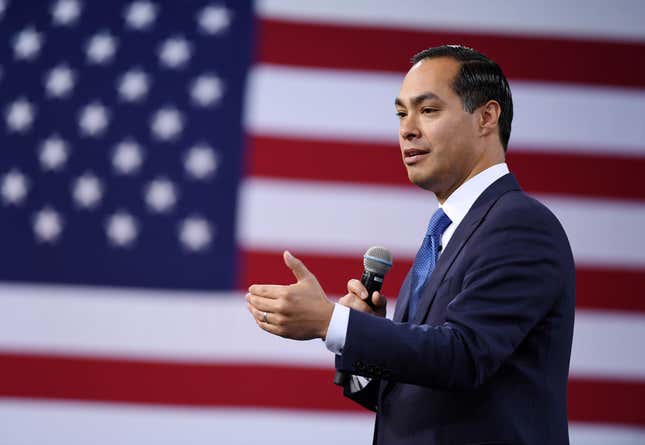
“Qualified immunity” refers to one of the most powerful federal laws that protects police officers from personal liability in cases of deadly force. But if Democratic presidential candidate Julián Castro has his way, the doctrine will be scrapped if he becomes president.
Last week, Castro introduced his “People First Policing Plan” which outlines how he would make policing more accountable to the public if elected president. While much of his plan relies on recommendations and withholding federal dollars from non-complying law enforcement agencies, qualified immunity is one of the few ways a sitting president can directly make cops accountable in a meaningful way.
“I don’t believe that an officer should basically be shielded from civil liability,” Castro said in an interview with The Root. “If an officer is going to be civilly liable, then that officer is going to think twice, which he or she should do before they use force against a civilian.”
Most laws that govern police officers’ actions are enforced at the state level, limiting the federal government’s ability to intervene. The doctrine of qualified immunity is a federal law that Congress can actually change. Castro’s plan says he will “work with Congress to put forward legislation to lower the unfairly high burden to prosecute police officers for misconduct—ensuring those who violate constitutional or legal protections of civilians under Section 242 are held accountable. Reform and restrict the ‘qualified immunity’ defense under section 1983 for law enforcement officers.”
Castro said he’d ideally want the doctrine to be “severely limited” or eliminated altogether.
Qualified immunity generally shields government officials from personal liability for actions conducted while doing their jobs. Police officers are protected under law, which is why cities end up paying hundreds of millions of dollars in civil settlements to victims’ families. By getting rid of qualified immunity altogether, citizens would have an easier time suing police officers directly. That way, citizens can sue police officers personally, as well as sue the municipality that employs them.
Eric Sanders, a civil rights lawyer and former NYPD police officer who has sued his former employer more than 100 times for excessive force on behalf of his clients, told The Root there is no reason police officers should be protected by qualified immunity.
“It’s just another way for police officers to escape liability,” Sanders said. “In theory, you can get a jury verdict in your favor. Then the judge can turn around and substitute their own judgment and dismiss your case. A judge can hold an advance and start a Rule 50 Motion and say the jury exceeded its authority and argue that the case had no liability or the jury misapplied the law and you have to give the officers qualified immunity because they have a defense that they did not violate the plaintiffs’ rights. A lot of people don’t know that.”
And Sanders, who recently won a $5 million settlement against the city for a black off-duty NYPD cop who was beaten by other NYPD officers, says no officer should push the argument that getting rid of qualified immunity makes them less safe.
“That’s nonsense,” he said. “Police officers don’t go through a checklist of what people think. Police officers are trained to react. What I am most critical of is that they are not reacting in the way they are trained to react. The whole point behind training is to get police officers to do things as automatically as possible. They don’t sit there and think, ‘If I make a bad decision, someone is going to second guess me.’ No. That is not going to stop making them do their jobs. The police unions and trade groups say that stuff. You have to be in the inside to understand it. For police officers who are professionals, those things do not affect them at all.”
Sanders adds: “If you cannot act professionally, then leave the police department. This job is not for you.”
There have been attempts over the years to challenge law enforcement’s use of qualified immunity. Last year, the U.S. Supreme Court ruled that a Tucson, Ariz., woman could not personally sue a police officer who shot her while she stood outside on her lawn holding a knife—even though the woman posed no threat to the officer. In January, the Supreme Court sent a qualified immunity case of a California man suing Escondido cops for excessive force back to a lower court. So, even when lower courts determine that officers do not qualify for immunity, the Supreme Court usually overrules them, as the late Judge Stephen Reinhardt wrote (pdf) in 2015. Reinhardt noted that most of the high court’s qualified immunity cases come out in favor of law enforcement and are used “as a mechanism to stunt the development of constitutional rights.”
As mayor of San Antonio, Tx., Castro said that he could not recall specific instances where he felt qualified immunity was grossly misused. But he does feel there were times the city paid out settlements the officer or the police department should have been forced to pay instead. As for the political pushback, Castro said he is sure there will be naysayers but is confident he is doing the right thing.
“There is a growing concern about the overuse of force in this country,” Castro said. “The fact that everyone has a cellphone camera and that we see these videos of the overuse of force constantly has opened a lot of people’s eyes to the urgent need to take action. So, yes, of course, everybody has a perspective and I respect the perspective of people who may believe that qualified immunity has a place. But you also have a lot of people who also see we need to change things.”

